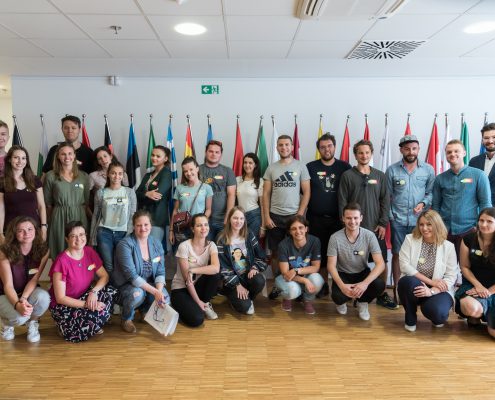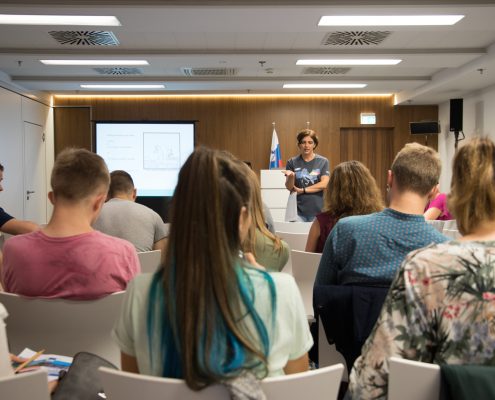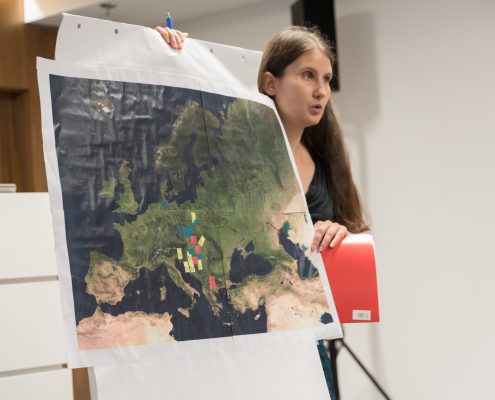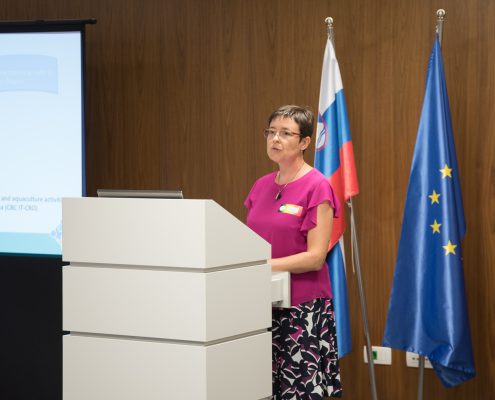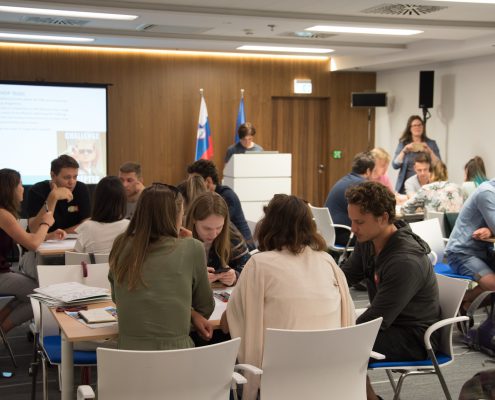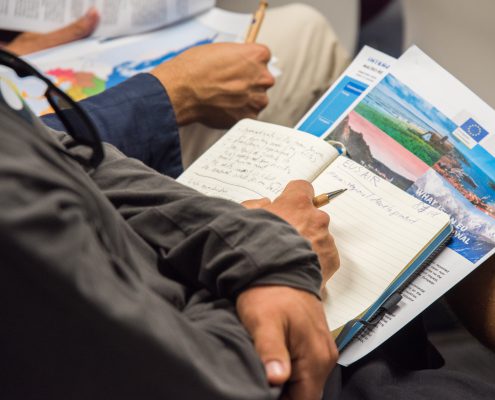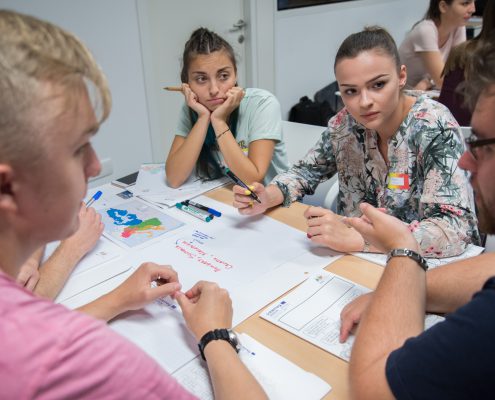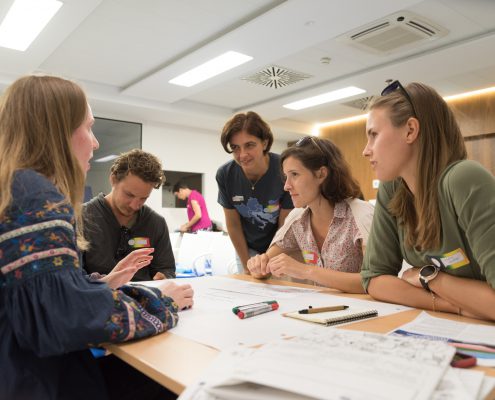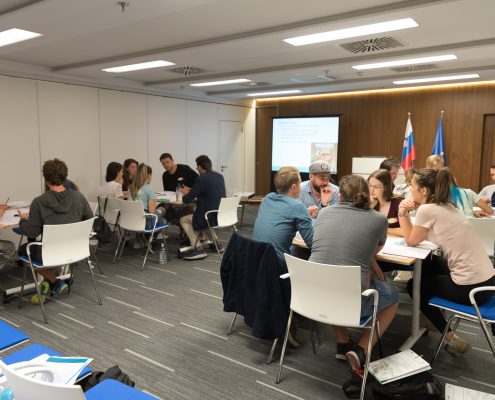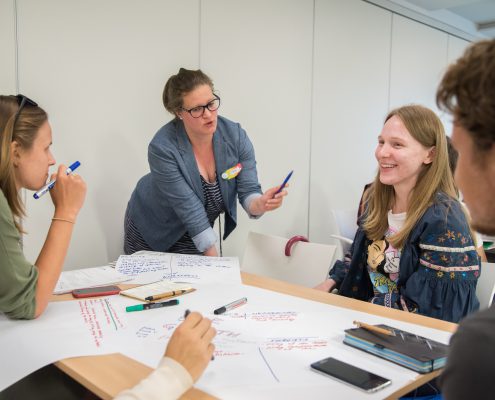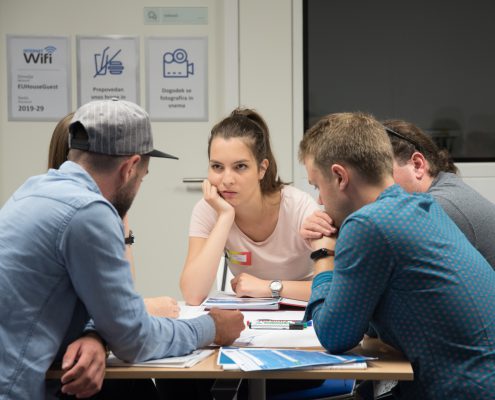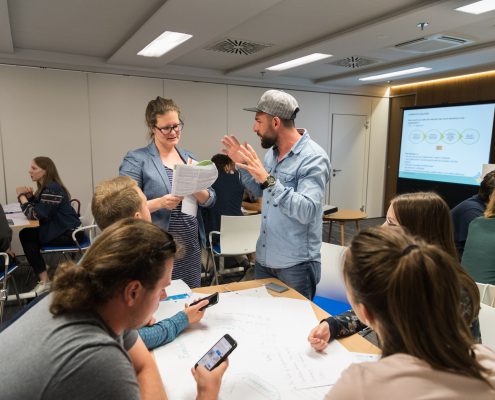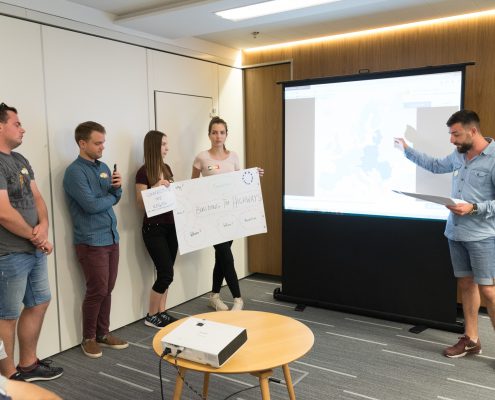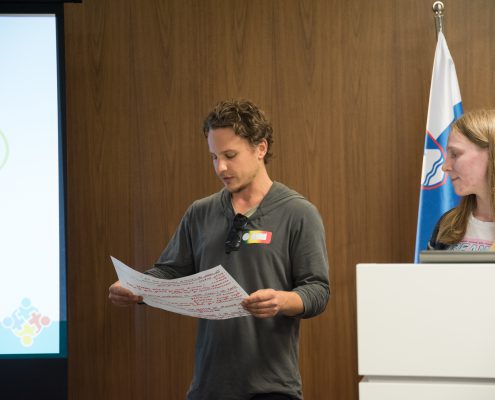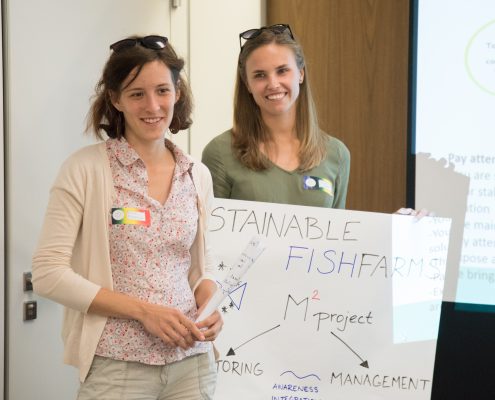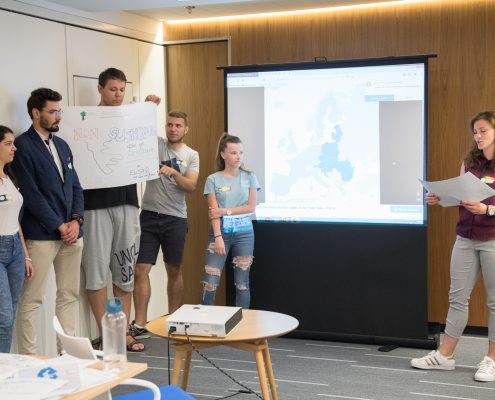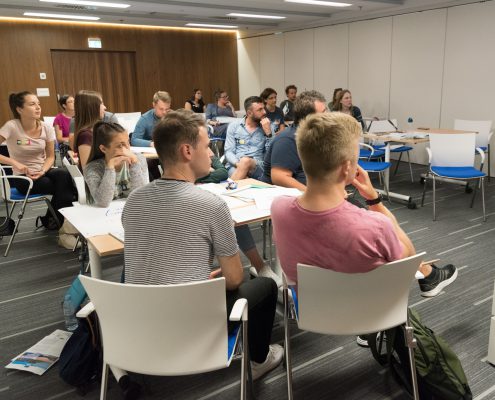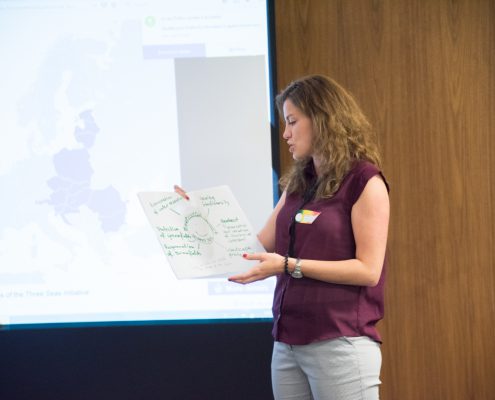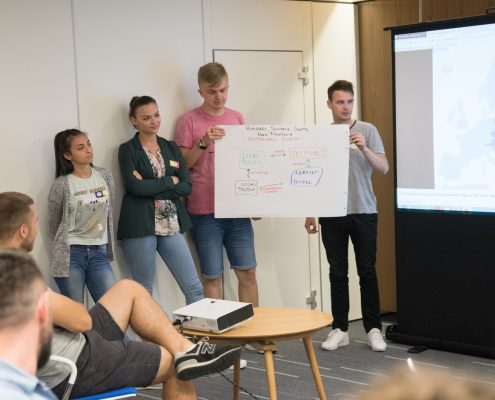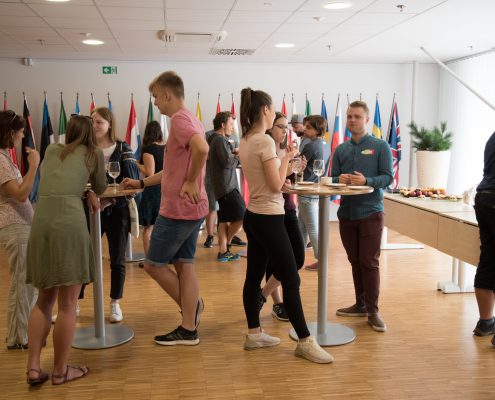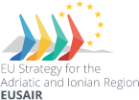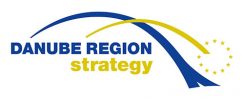The voice of Students: Summer school on Macroregional strategies in Ljubljana
On the 8th of July, the Government Office of the Republic of Slovenia for Development and European Cohesion Policy organized a 1-day long student workshop on »Macro-regional cooperation in planning sustainable use of regional resources«.

Altogether, 21 Master and PhD students coming from 9 countries - Czech Republic, Poland, Slovakia, Bosnia and Herzegovina, North Macedonia, Croatia and Germany gathered in the premises of EU House Slovenia in Ljubljana to learn new skills and knowledge in the professional field of EU cohesion, Interreg programs and macroregional initiatives.
The workshop was organized in cooperation with the University of Ljubljana, Faculty of Arts, Department of Geography and fell within the scope of the 9th International GeoRegNet Summer School 2019 gathering students of the CEEPUS university network (Central European Exchange Programme for University Studies).
After workshop for young journalists held at the occassion of the 4th EUSAIR Annual Forum in May in Budva, this is the second workshop the EUSAIR Facility Point organized for a stakeholder group »research and academia«. Research and academia are recognized as an important stakeholder group for implementing the EUSAIR Strategy and the four pillars of EUSAIR.
The main idea of the Lead partner in organizing such an event was to collect students' ideas and perceptions regarding the macro-regions and seek interest for possible future collaboration in the activities of the EUSAIR Strategy and the EUSAIR Facility Point project. In order to raise awareness and encourage possible future contribution to the EUSAIR implementation, the Lead partner provided students with conceptual knowledge of macro-regional cooperation and the uniqueness of such cooperation from the practical point of view. Students appreciated the opportunity to obtain new experience. Students evaluated the event and gave video interviews, at the end of the course.
The morning part was dedicated towards familiarizing with the overall idea of macro-regions in general and the EUSAIR Strategy in particular. Next, the specifics of the Adriatic-Ionian region were introduced – Western Balkan countries, EU integration process, various socio-economic differences, etc. The four thematic pillars of EUSAIR and the ongoing mono-pillar projects were introduced. As a plus, the latest advances in cross-pillar project development were presented with an aim to show students concrete outputs resulting out of cooperation among the 8 participating countries of EUSAIR.
As a core activity of the day, the Lead Partner prepared a two –stage »simulation model of EUSAIR macro-regional process«. Participants were divided into four groups per 5-6 students, each group representing one of the four EUSAIR pillars. Each group had a task to chose a topic correlating to a thematic area of a particular pillar, and try to simulate a macro-regional cooperation.
To support the exercise, the following guidance were provided to students:
- Identify a PROBLEM = find a common topic within a Pillar that is challenging
- Argue why the topic is important at the macro-regional level and why a single country could not be efficient addressing the challenge alone
- Conduct SWOT and GAP analysis
- Find possible SOLUTION(s) for the PROBLEM
- List down the type and scope of cooperation needed to address the challenge
To make the exercise even more challenging, the afternoon session familiarized participants with techniques and approaches needed to suceed in communication. After identifying the problem and finding the solution, students were asked to identify the main target group when addressing their problem and formulatingtheir message accordingly.. The main key takeway is that the theory differs fromt he real-life situation. Although the main goal is to influence the decission maker, accoridng to students, the way to get there is not always direct and simple, but you need to consider various approaches and tactics and some communication methods can be helpful in this regard. Students also learned that listening skills and cultural awareness is as much important for successful communication. Thus, being an effective communicator requires identifying not only the right target groups, but also the most efficient target group, be clear ont he problem and solution and establish oneself as a resource for problem solving.
The main idea was to let them know, that the final beneficiary of the solution and the stakeholder helping you to solve the problem and achieve your goal are not always the same actor.
Students brought into discussion the knowledge from their own countries, which sparked a lively debate amongst the participants. They also realized that taking into account all the different views on board is not so easy, and that you need a lot of cooperation, and that the way towards findign a solution is not one-sided and unilateral. The group work created an overall in-formal and relaxed environment. Students rated their existing knowledge on macro-regional strategies on the range »from basic to average«, nevertheless, a lively discussion flourish out of a group work and created a space for knowledge transfer.
Interesting ideas and proposals reulted out of a group work and at the end of the session, students had the opportunity to present their work and defend their ideas infront of their colleagues and answer questions from the audience.
- The Blue group (Pillar 1 Blue Growth)
agitated for establishment of Sustainable Fish farms to breed fishes for the open sea in safe environment. The argument for choosing this topic was an ongoing climate threat which causes the rise of a temperature and of sea level in the Adriatic-Ionian Region and also at the global level. Students from this group called upon policy makers to change legislation in order to actively promote a pro-sustainable growth in the sea, as well as the fight against overfishing. In this respect, a need for a consensus of all involved countries in the region was pointed out. The group saw the main solution in gaining a local public support, in particular local fishermen. To make a real difference, fishing methods of companies as well as consumer habits have to change. Suggested method to be used to raise awareness of the problem among authorities was a scientific paper or a report with a comprehensive assessment of the status of fish quality in the sea. Along with changes in the policy making, a sound monitoring and management system should be established. Only all phases combined can contribute to a sustainable aquaculture in the region.
- The Yellow group (Pillar 2 Connectivity)
A group of students dealing with the topic Connecting the Region pointed out lack of infrastructure in the former Eastern Block and Balkans. In order to solve the identified problem in the region they proposed building highways, which would assure better connection of the regions in central and eastern Europe with Western Balkans as well. A strategic Baltic-Adriatic highway seemed to be especially interesting option. Beside enabling faster travelling and reducing congestions, those highways would have a positive impact also on the economy growth and sustainable development in the big industrial areas, as well as on the cultural and social life in the regions. Pollution caused by plane travelling was pointed out, on which regard they stressed the eco-friendly intend to promote electromobility on those roads and to build green bridges for animal crossings, as well as taking into account green corridors. On the question how this should be done, students proposed cooperation between public and private sector of all involved countries with additional help of EU funds, but they also set their foot down on the statement that “sometimes it is more important to have EU support than funds”, since this may assure the mentioned cooperation. This issue should be in their opinion communicated to civil society, to all citizens of the region, institutions and organisations, which may be helpful in exerting pressure on the decision makers for realisation of the idea.
- The Green group (Pillar 3 Environmental Quality)
The Green group identified the “Vulnerability of landscape” as the main challenge within the Environmental Quality. Although landscape is one of the most valuable resources of this region, Europe is facing dramatic effects due to its non-sustainable overuse: disappearing lakes, water pollution and erosion, overbuilding/overpopulation on the coasts, destroying biodiversity, limited animal corridors… The main message of this group was: “Nature doesn’t know and care for the administrative borders, therefore landscape protection from negative human impact and development of sustainable landuse for future generation is absolutely necessary.” The latter includes regeneration of water resources and brown fields, protection of green fields, preservation and creation of ecological corridors and saving biodiversity. For realisation cooperation in law/regulations among all states is needed with regard to the subsidiarity and multidisciplinary principle, as well as moving from education to motivation for sustainable spatial planning. Seeing that such measures do not provide immediate effect, which would be helpful at the elections, young generations have to push for political motivation of policy authorities at national, regional and local level for necessary strict regulation of sustainable landscape planning. As well as to gain support of the community (academia and ordinary citizens).
- The Red group (Pillar 4 Sustainable Tourism)
Students of the Red group recognised Music festivals as an incentive to boost development and economy in rural areas and hinterlands. They proposed moving Music festivals from centres to the “forgotten places”, as they called it, having in mind the areas away from the main cities. These would give locals living in these areas the possibility to earn extra income, by selling hand-crafted products, renting their accommodations, advertising rich historical monuments and cultural heritage. In addition, it would provide an opportunity raise creativity among local stakeholders, help form a local identity and raise trust. On the question on why such music festivals in remote areas are not a reality yet in their home countries, students pointed out the lack of knowledge as the main obstacle. The main problem with which the Red group was dealing with was “What to do with those investments after the end of festivals?” They stressed that closure of festivals is the time where creativity of the locals kicks in. In their opinion, festivals are only an incentive for further business development in hinterlands. Therefore communication should be primarily oriented towards local initiatives/ stakeholders and well-established organizers of festivals.
Overall, the bold idea of introducing students with the macroregional process was done with an aim to get fresh ideas and opinions and to see, what topics, linked with to the four thematic pillars of EUSAIR, the students are interested in. Students were a great audience and were very active in finding the most challening problems of nowdays and link them to concrete existing initiatives. Overall the course stimulated an interesting learning experiment and a good social dynamic. It was a great learnign exercise both, for students and for the EUSAIR Facility Point Lead Partner.
Event snapshots
You might be interested in
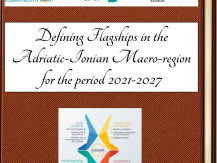
EUSAIR flagships all summed up!
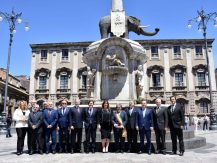
3rd EUSAIR Annual Forum – CATANIA DECLARATION

The Hellenic Republic assumes the Presidency of the EU Strategy for the Adriatic and Ionian Region (EUSAIR) (1 June 2024 – 31 May 2025)




